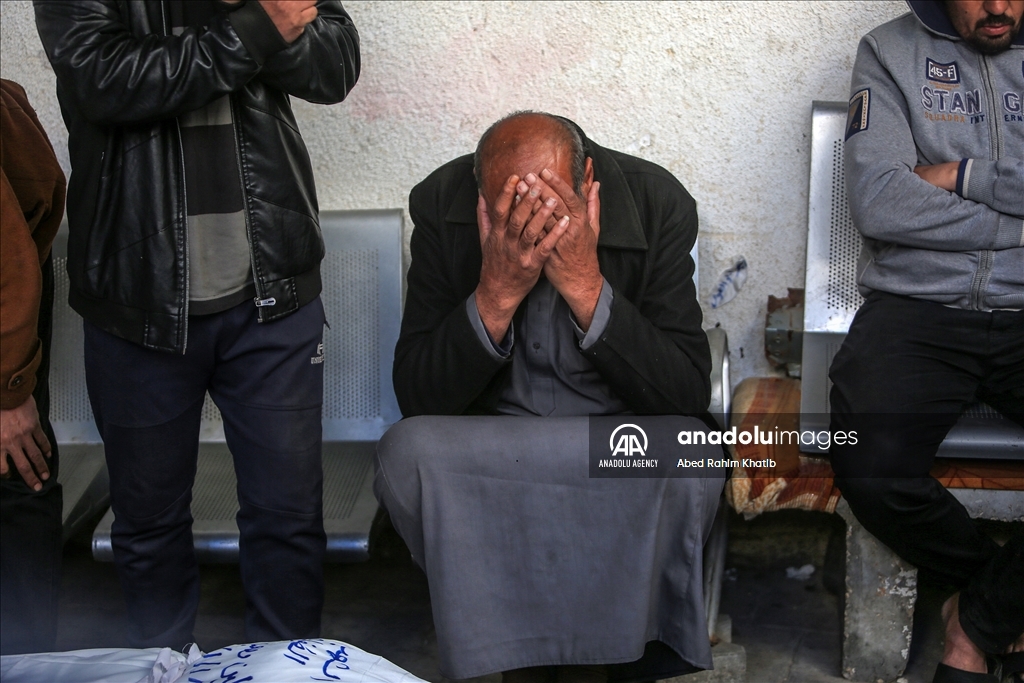ISTANBUL
The humanitarian crisis in the Gaza Strip is reaching catastrophic levels, intensifying each day.
UN authorities have described the enclave as “a place of death and despair” in the past three months of the conflict.
Nearly 25,000 Palestinians have since been killed, mostly women and children, and almost 62,500 injured, according to the Health Ministry in the blockaded enclave.
More than 1.9 million have been forced to leave their homes, some multiple times.
According to the UN, 85% of the population of Gaza is already internally displaced, amid acute shortages of food, clean water and medicine, while 60% of the enclave’s infrastructure is damaged or destroyed.
Tommaso Della Longa, the International Federation of Red Cross and Red Crescent Societies’ spokesperson (IFRC), said the situation is getting “worse and worse.”
“What we are seeing is what we predicted, and not because we are magicians, but because we know by experience,” he told Anadolu, adding that hundreds of thousands of Palestinians are in shelters without access to running water, proper food and adequate sanitation.
The entire population of Gaza faces crisis levels of food insecurity or worse, according to the World Food Program (WFP), which has warned of an impending famine.
More than half a million people in Gaza are starving, with nine out of 10 Palestinians eating less than one meal a day and struggling to find clean, drinkable water.
“It is beyond the catastrophic,” said Della Longa.
“We knew since the beginning that the lack of food, the lack of clean water, lack of shelter, lack of proper shelter, with running water, and sanitation would have led to what is happening now, which means respiratory diseases, diarrhea is spreading like a wildfire among the population,” he said.
Due to Israel’s attacks, the infrastructure and basic services have been collapsing daily. As of Dec. 30, approximately 65,000 housing units in the Gaza Strip have been destroyed or made uninhabitable, with an additional 290,000 units suffering damage, as reported by the Government Media Office in Gaza.
Israeli attacks have also annihilated Gaza’s health care system.
Based on the most recent evaluations by the WHO, Gaza currently has 13 hospitals operating at partial capacity, two with minimal functionality and 21 that are entirely non-functional. That includes the Nasser Medical Complex, a crucial referral hospital in southern Gaza, which is partially operational.
“The level of destruction is unprecedented,” said Della Longa. “There are places in the north that are completely flattened, infrastructure that doesn’t exist anymore, water pumps that are not working anymore, hospitals that were mainly closed or destroyed.”
“We will need the enormous effort of the international community to show solidarity and support to the Palestinians in the Gaza Strip,” he said.
A timeline for reconstruction is “very difficult,” he said, stressing that even if the conflict ends, “it will take years to go back to a kind of a normal life.”
He stressed that life has never been normal in Gaza.
“Before the beginning of this conflict … the normal life was not normal at all. The people in Gaza have been suffering. Sometimes the international community is forgetting that people in Gaza were suffering even before this,” he said.
“It was suffering conflict. They were suffering lack of access. They were suffering lack of medicine and so on. So, the hope here is that the international community will be able to show solidarity, proper support to the Palestinians.”
Israel attacks on ambulances are ‘unacceptable’
Israeli fighter jets struck an ambulance in Deir al-Balah last week, killing four members of the Palestinian Red Crescent Society and two patients.
The IFRC condemned the attack and said the deaths were “shocking and completely unacceptable.”
“It’s unacceptable that an ambulance ended up in a line of fire,” said Della Longa. “The ambulance was clearly marked with the Red Cross, the Red Crescent emblem, which under Geneva Convention international humanitarian law, must be respected and protected by all the parties of the conflict.”
“We condemn this type of act and we call on all the parties to respect and protect the workers and, of course, the civilians and care facilities,” he added.


